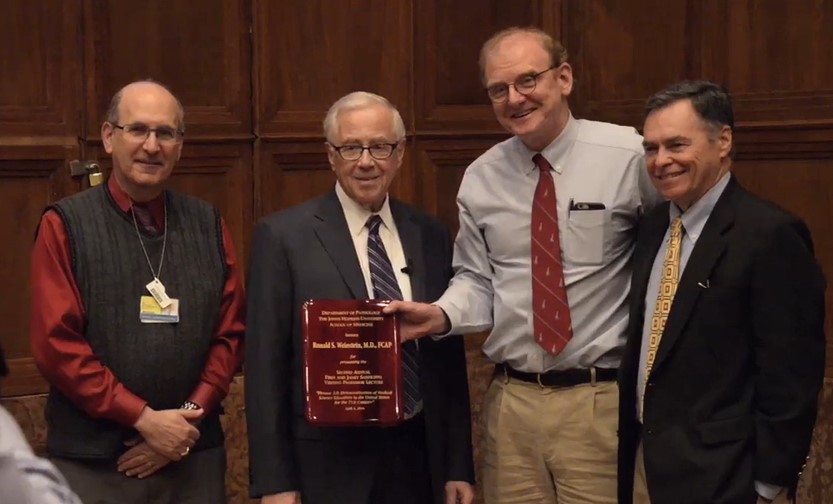Flexner 3.0 - Democratization of Medical Knowledge for the 21st Century:
Teaching Medicial Science Using K-12 General Pathology as a Gateway Course
Ronald S. Weinstein, MD, FACP, Elizabeth A. Krupinski, PhD, John B. Weinstein, PhD,
Anna R. Graham, MD, FACP, Gail P. Barker, PhD, Kristine A. Erps, Angelette L. Holtrust,
and Michael J. Holcomb, BS
Click here for PDF of the paper
Video Presentation - Johns Hopkins - The Fred and Janet Sanfilippo Distinguished Visiting Professorship
Ronald S. Weinstein, MD, Unveils Flexner 3.0 Medical Science Curriculum in Historic Hurd Hall at Johns Hopkins School of Medicine on April 4, 2016
Dr. Ronald S. Weinstein, professor of pathology and medical imaging at the University of Arizona College of Medicine – Tucson, and a Massachusetts General Hospital-trained pathologist, delivered the Fred and Janet Sanfilippo Distinguished Visiting Professor Lecture at Johns Hopkins University School of Medicine on April 4, 2016, in the historic Hurd Hall in Baltimore, Md. “Flexner 3.0,” Dr. Weinstein’s latest invention, recalibrates health science education for the United States by repositioning “introduction to medical science coursework” from medical schools into K-12 schools. His Flexner 3.0 program also calls for reducing high school education by two years, and college and medical schools’ by one year each. By relocating medical science into middle schools and high schools, physician indebtedness could be eliminated, potentially redirecting some medical students into primary care careers downstream. Dr. Weinstein has been developing and testing this concept of K-12 medical science curriculum since 1978 when he established his first Sir William Osler Summer Fellowship program at Rush Medical College in Chicago, where he served as chair of pathology for 15 years prior to relocating to Arizona. William Osler, MD, was the first chair of medicine at the new Johns Hopkins University School of Medicine in 1892. Dr. Osler brought humanities into medical education, and has been Weinstein’s career-long source of inspiration.
Dr. Weinstein states, “It was an honor to be invited to introduce the Flexner 3.0 curricular model at Johns Hopkins School of Medicine, the institution that pioneered our current standard model for medical education. The 1910 Flexner Report’s (also called Flexner 1.0) recommendations provided the framework for the basic curricular model upon which medical education is based today." Dr. Weinstein added, “Moving toward the Flexner Centennial Celebrations, scheduled for 2010, it became evident that the Flexner model was becoming outdated, and had produced collateral damage. Flexner celebrations became muted, as thought-leaders began to cope with potentially related problems, including an unanticipated high level of medical error-related deaths in the United States, and underutilization of health-care teams.” Dr. Weinstein recently discovered that curricular disparities among medical schools, nursing schools and pharmacy schools may be a root cause of communication barriers within health-care teams.
The Sanfilippo Distinguished Visiting Professor Lecture at Johns Hopkins University School of Medicine is part of their Department of Pathology’s Grand Rounds lecture series. Nationally, the Johns Hopkins pathology department ranks number one in research funding for a pathology department, with nearly $48 million dollars in NIH annual funding alone.
Dr. Weinstein is a nationally acclaimed innovator whose OWLCAT education software company, acquired by Digital Research, Inc. in 1984, pioneered the use of games in PC-based SAT educational software in the early 1980s (OWLCAT/Digital Research, Inc.). He invented, patented and commercialized telepathology (remote diagnosis using video technologies) including introducing the word “telepathology” into the English language; created and directed the National Urinary Bladder Flow Cytometry Network for the National Cancer Institute, which is credited with bringing flow cytometry, a diagnostic tool, into clinical urology practice; and co-designed the international award-winning T-Health Amphitheater, an “e-classroom-of-the-future” on the Phoenix Bioscience Campus in downtown Phoenix. Another one of Weinstein’s start-up companies, DMetrix, Inc., was runner-up to General Electric in The Wall Street Journal's Technology Innovation Awards competition and won the Arizona BioIndustry Association's Bioscience Startup Company of the Year award.
Well known for his innovations in education, Dr. Weinstein was the first MD to receive the UA College of Medicine’s Basic Science Educator of the Year Lifetime Award, and he received the UA 2012 Technology Innovation Award. He has been inducted into the U.S. Distance Learning Associations’ Hall of Fame for innovations in education programming over the telemedicine network he created. Dr. Weinstein has been president of six professional organizations and has more than 600 professional publications on topics ranging from cancer cell biology to post-graduate education.
